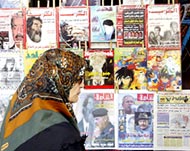Iraqi press: From restriction to laxity
Every day, dozens of newspapers find their way to vendors throughout Iraq, ready to cater to an increasingly politicised and eager readership.

Unlike before, most of these newspapers are free of censorship.
Today’s newspapers, whether daily or weekly, differ in their political slants. Some claim to be independent, often the brainchild of a wealthy Iraqi businessman.
Others are not so independent, nor do they claim to be. None the less, as quickly as these publications emerge, some stumble and fade away soon after launching. Habzbuz, Addwa and al-Manar count among the least successful.
Many, if not all, of the political parties that were started or revived after the toppling of the Iraqi government have their own newspapers.
It is no secret that Tariq al-Shaab (the Path of the People) is the mouthpiece of Iraq’s Communist party, Baghdad of the National Alliance, Mutamar (The Conference) of the National Conference party and al-Addala (Justice) of the Supreme Council of the Islamic Revolution.
The list is too long to include in its entirety. However, it should not be forgotten that some of Iraq’s newspapers are funded by the US. Al-Sabbah is one.
University viewpoint
To shed more light on this subject, Aljazeera.net visited Baghdad’s College of Journalism in Baghdad University and met the students and their teachers.
A common belief was in the value of press freedom. But many still warned that the lack of censorship should not be understood as an invitation to compromise on journalistic integrity, the ethics of the profession and, most importantly, the values of Iraqi society itself.
 |
|
Some students believe too many |
PhD student Nahla Abd al-Raziq contests that, despite the upsurge of intellectual freedom in Iraq, the press is unable to reflect the aspirations of the people. To work efficiently, “journalism needs planning, research and qualified experts,” she says. “Iraq needs sensible and honest newspapers, ones that are objective in reflecting the reality of what is taking place in our country.”
Ahmad Abbass, a journalism student, agrees. “Having this high number of newspapers is not a healthy phenomenon,” he says. None the less, Abbass argues that some of the newspapers on the street standout in terms of content quality and professionalism.
Variety and diversity
But there is nothing wrong with having such a large number of publications says the dean of the college, Hamida Sumysim. According to Sumysim, the problem doesn’t rest in the number, “but the quality of what is published and the inability of some to rise above ethnic and religious divides”.
“Some of these newspapers are valuable and have proven themselves to be so, especially after the disintegration of smaller publications that sprung out of the chaos,” she said.
Dr Muyad Asim, a professor at the college, foresees that once serious journalism takes hold in Iraq, the Iraqi press will be able to break loose from its geopolitical limits and reclaim its rightful spot as a regional player.
“I hope to see an advanced press system, entirely different from the way it was under the past regime,” says Asim.
Free press
Outside the campus, Aljazeera.net met with the secretary-general of the press committee for the US-appointed Iraqi Governing Council (IGC), Ibrahim al-Zubaidi. He insists that something positive has come out of the ongoing media free for all.
“The [Iraqi] citizen is practicing his right to express himself, his right to run a newspaper, to share information and to construct a democratic free press that respects and accommodates all points of view,” he said.
Inciting violence or widening the ethnic divide is one taboo the IGC press committee vows to fight.
Although the IGC has been ridiculed for censoring its critics by banning TV stations and reporters, many Iraqis agree that the country’s press now has greater scope to express itself. The remaining challenge is whether the new publications truly reflect the aspirations, and cater for the needs, of ordinary Iraqis. This is yet to be seen.